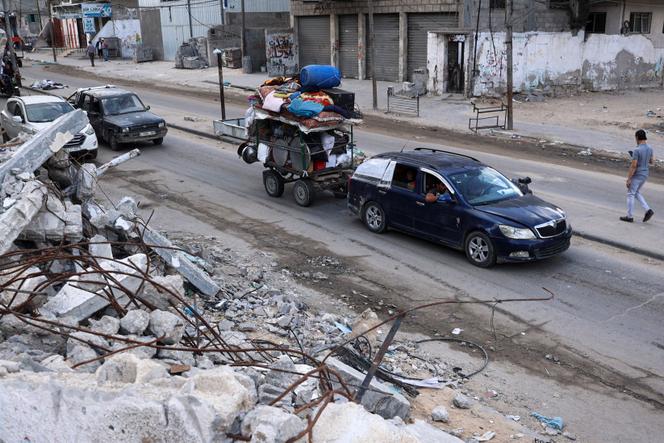


The photo arrived on the night of Monday, May 13, sent in a rare moment of internet connection: A portrait of a sleeping baby, his face peaceful, swaddled in a huge orange blanket. Youssef was one week old. His mother, Mona Safi, had given birth by Caesarean section on May 7, in a hospital in the city of Rafah, at the southern tip of the Gaza Strip. The 25-year-old mother had been lucky, as she had been able to receive anesthesia, said the baby's father, Mohammed, in a WhatsApp conversation with Le Monde.
Just a few hours after giving birth, under fire from bombings, the little family had been forced to evacuate. "We took my brother-in-law's car," explained Mohammed, a 30-year-old dentist, who described how they had headed for the center of the coastal enclave. This had been their third such journey since the start of the Israeli offensive on October 7, 2023, in response to the attack committed that same day by Hamas in the south of Israel.
"There are eight of us in a 70-square-meter apartment," described Mohammed Safi. "Food is very expensive, and very scarce since the Israeli army entered Rafah [on May 7]. For example, there's no more chicken or meat. The same goes for fruit. Vegetables are extremely expensive. A kilo of potatoes costs $10 [€9]; 1 kilo of lemons, $30." Drinking water was only available once every three days. Mona was unable to breastfeed. The family was spending its savings on overpriced powdered milk. They were now waiting for the reopening of the Rafah crossing to Egypt – the only way out of the hell that Gaza has become – which has been closed since Israeli troops took control of it. Mohammed was hoping for one final exodus, this time out of Gaza: "My son deserves to live like all the other children in the world, in peace."
At the beginning of May, the people of Gaza had briefly believed that their ordeal might be coming to an end. "People were following the negotiations [between Hamas and the Israelis], they had hope that the war would end, that this life in tents, these daily humiliations, would come to an end," said Mohammed Al Najjar, a law student from Rafah. On the evening of May 6, Rafah residents took to the streets to celebrate Hamas's announcement that it had accepted a ceasefire agreement, believing that the war would soon break off.
Israel, however, disassociated itself from this agreement, and the following day its tanks destroyed the "I love Gaza" sign erected at the entrance to the Rafah terminal on the border with Egypt. This attack marked the beginning of the ground invasion of the last Gazan city not to have been taken over by Israel's forces. Israel has insisted that this was a limited offensive, but its leaders have proclaimed their determination to defeat the last remaining Hamas battalions, which they claimed were entrenched in the town. US officials, however, have indicated that, according to their information, the leader of the Islamist movement and mastermind behind the October 7, 2023 attacks, Yahya Sinwar, could not be found there.
You have 61.68% of this article left to read. The rest is for subscribers only.
